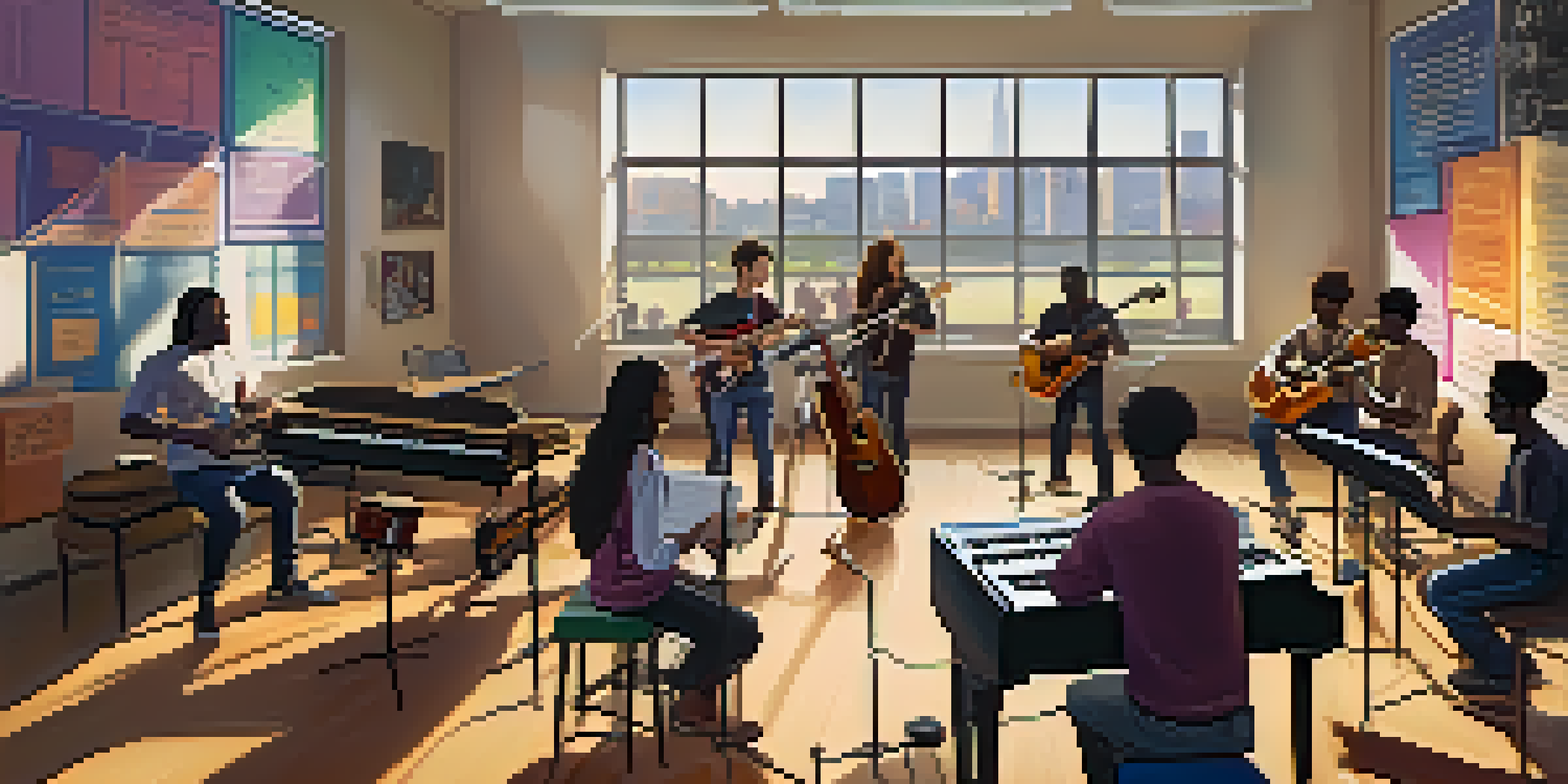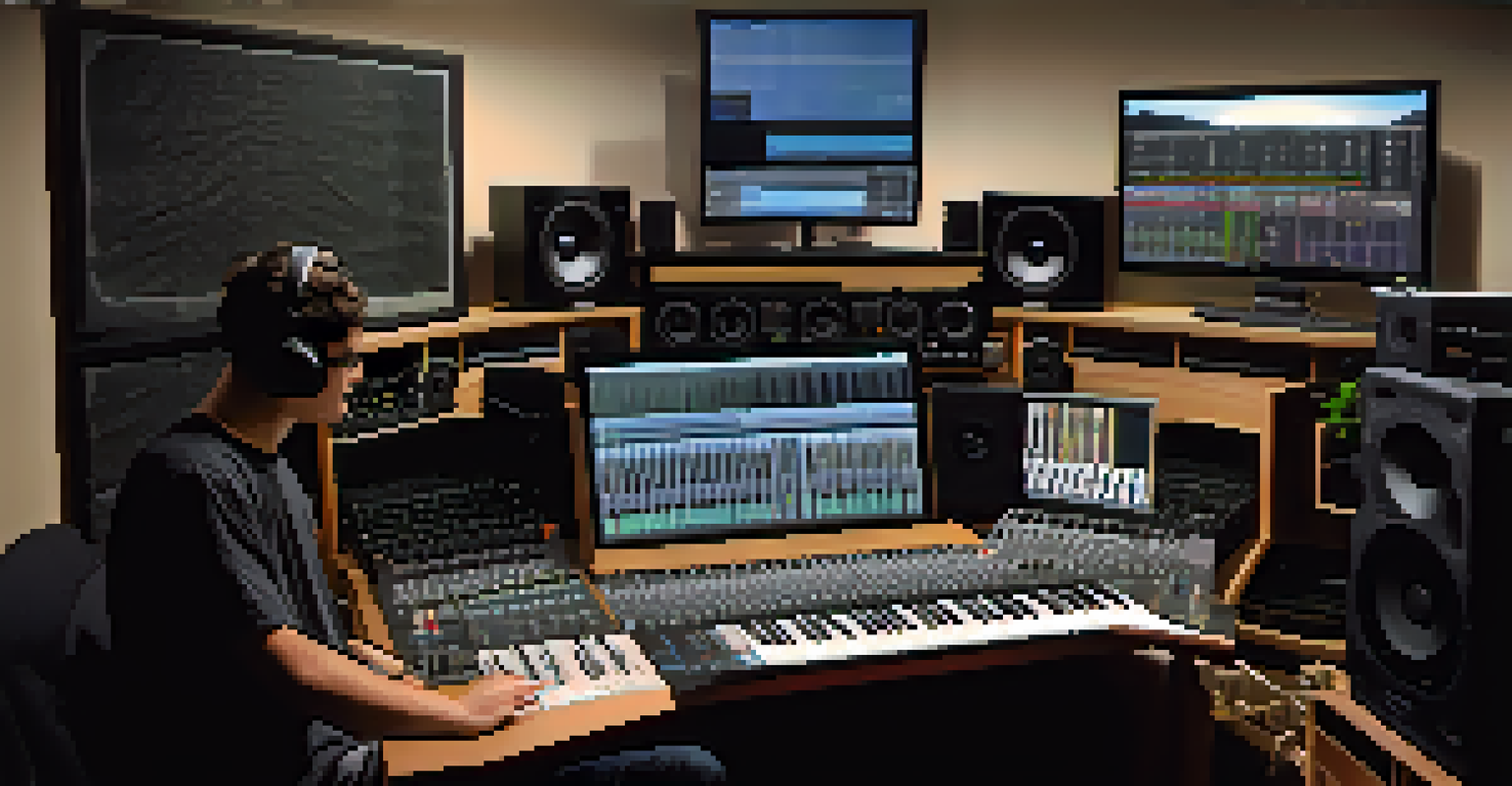The Role of Community Colleges in California's Music Education

Overview of Community Colleges in California's Music Scene
California's community colleges serve as vital hubs for music education, offering diverse programs that cater to aspiring musicians. With over 100 colleges across the state, they provide accessible pathways for students to explore their musical passions. These institutions often boast experienced faculty, many of whom are active musicians themselves, enriching the learning experience with real-world insights.
Music education is a pathway to self-discovery and community building.
The community college system is designed to be inclusive, welcoming students from various backgrounds, including those who may not have had access to formal music training. This open-door policy fosters a diverse student body, creating a vibrant environment where creativity flourishes. As a result, many community colleges have become incubators for emerging musical talent.
Additionally, the affordability of community college tuition makes it a practical choice for many students. This financial accessibility allows more individuals to pursue their dreams of a career in music without the burden of overwhelming debt, thus encouraging a broader range of voices in California's music landscape.
Curriculum Offerings and Specializations in Music
Community colleges in California offer a wide array of music programs, ranging from performance and composition to music technology and business. This variety allows students to tailor their education to their specific interests and career goals, whether they aspire to be performers, educators, or behind-the-scenes producers. Many colleges also provide certificate programs, which can be an attractive option for those looking to enhance their skills without a lengthy commitment.

Moreover, these colleges often collaborate with local music organizations and festivals, providing students with hands-on experience that is invaluable in the competitive music industry. For example, students might participate in internships or workshops that connect them with industry professionals, giving them a foot in the door. This experiential learning is crucial in helping students build networks and gain practical skills.
Diverse Music Programs Available
California's community colleges offer a wide range of music programs, allowing students to pursue various interests and career paths.
In addition to traditional coursework, many community colleges emphasize the importance of ensemble participation. By playing in bands or orchestras, students not only hone their performance skills but also learn teamwork and collaboration—key elements of any successful music career. This focus on ensemble work enriches the overall educational experience and prepares students for real-world musical collaborations.
Support Systems for Aspiring Musicians
Community colleges provide extensive support systems that help aspiring musicians navigate their educational journey. From academic advising to tutoring services, these resources ensure that students can succeed both in and out of the classroom. Additionally, many colleges offer career counseling specifically tailored to the music industry, which can be particularly helpful for students unsure of their next steps.
The beauty of music is that it connects us all, regardless of our backgrounds.
Mentorship programs are another valuable resource found in many community colleges. Experienced faculty often take on mentorship roles, guiding students through both their academic studies and their personal growth as musicians. These relationships can lead to opportunities for networking, collaboration, and even job placements in the future.
The community aspect of these colleges also plays a crucial role in fostering a supportive environment. Students often form tight-knit bonds with their peers, creating a community of musicians who encourage and inspire one another. This collaborative spirit is essential for artistic development and can lead to lifelong friendships and professional connections.
Access to Performance Opportunities
One of the standout features of community colleges in California is the emphasis on live performance opportunities. Many institutions host regular concerts, recitals, and showcases that allow students to perform in front of an audience. This experience is invaluable, as it helps students build confidence and stage presence—skills that are critical for any musician.
Additionally, community colleges often partner with local venues to provide students with real-world performance experiences. These collaborations can include everything from open mic nights to full concerts, giving students a taste of what it's like to perform professionally. Such opportunities not only enhance their resumes but also help them gain practical experience in managing performance anxiety and engaging with an audience.
Strong Support for Musicians
These colleges provide extensive support systems, including mentorship and career counseling, to help students succeed in their musical journeys.
Furthermore, these performance opportunities foster a sense of community among students and faculty. Performing together encourages collaboration, creativity, and mutual support, which are essential for a thriving music program. In essence, these experiences contribute significantly to the overall educational journey of a music student.
The Role of Technology in Music Education
As technology continues to evolve, community colleges in California are adapting their music programs to incorporate the latest tools and techniques. Many institutions offer courses in music production, audio engineering, and digital composition, equipping students with the skills needed to thrive in a digital landscape. This integration of technology is crucial for students aiming to enter contemporary music fields, such as electronic music or film scoring.
The use of technology also extends to virtual learning environments, which became increasingly important during the pandemic. Community colleges quickly adapted by offering online courses and virtual performances, ensuring that students could continue their education uninterrupted. This flexibility has opened up new avenues for students, allowing them to connect with peers and faculty from anywhere in the state.
Moreover, access to state-of-the-art recording studios and equipment enhances the learning experience for students. Many community colleges invest in high-quality technologies to provide students with hands-on training that mirrors professional environments. This access not only enriches their education but also prepares them for the demands of the modern music industry.
Building Bridges with Local Music Communities
Community colleges play a pivotal role in connecting students with local music communities. By fostering partnerships with local organizations, industry professionals, and music festivals, these colleges create a network that benefits both students and the broader music scene. These connections often lead to collaboration opportunities, internships, and job placements that can significantly impact a student's career trajectory.
Moreover, community colleges often host events that bring together students, faculty, and local musicians. This interaction not only enriches the educational experience but also strengthens community ties. By participating in workshops, masterclasses, and jam sessions, students can learn directly from experienced musicians and gain insights into the industry that are not available in a traditional classroom setting.
Performance Opportunities Abound
Community colleges emphasize live performance experiences, helping students build confidence and connect with local music communities.
These collaborations also benefit local music scenes by ensuring a steady influx of fresh talent. As students graduate and enter the music workforce, they contribute their skills and creativity to the community, enriching the local culture. In this way, community colleges serve as essential bridges between education and the vibrant music ecosystem of California.
Challenges and Opportunities Ahead for Music Programs
While community colleges provide invaluable music education, they also face challenges, including budget constraints and competition from four-year institutions. These challenges can impact program offerings and resources, making it crucial for colleges to seek innovative solutions for sustainability. However, the growing demand for music education presents a significant opportunity for these institutions to expand and enhance their programs.
In response to these challenges, many community colleges are exploring partnerships with nonprofit organizations and local businesses to secure funding and resources. These collaborations can provide additional support for music programs, helping to ensure that students have access to the tools and experiences they need. By pooling resources, colleges can create a more robust music education environment that benefits everyone involved.

Looking ahead, the focus on inclusivity and accessibility in music education will continue to be a driving force. Community colleges are uniquely positioned to serve diverse populations, and by embracing this mission, they can foster a new generation of musicians who reflect the rich cultural tapestry of California. By continuing to adapt and innovate, community colleges can ensure their music programs remain relevant and impactful.